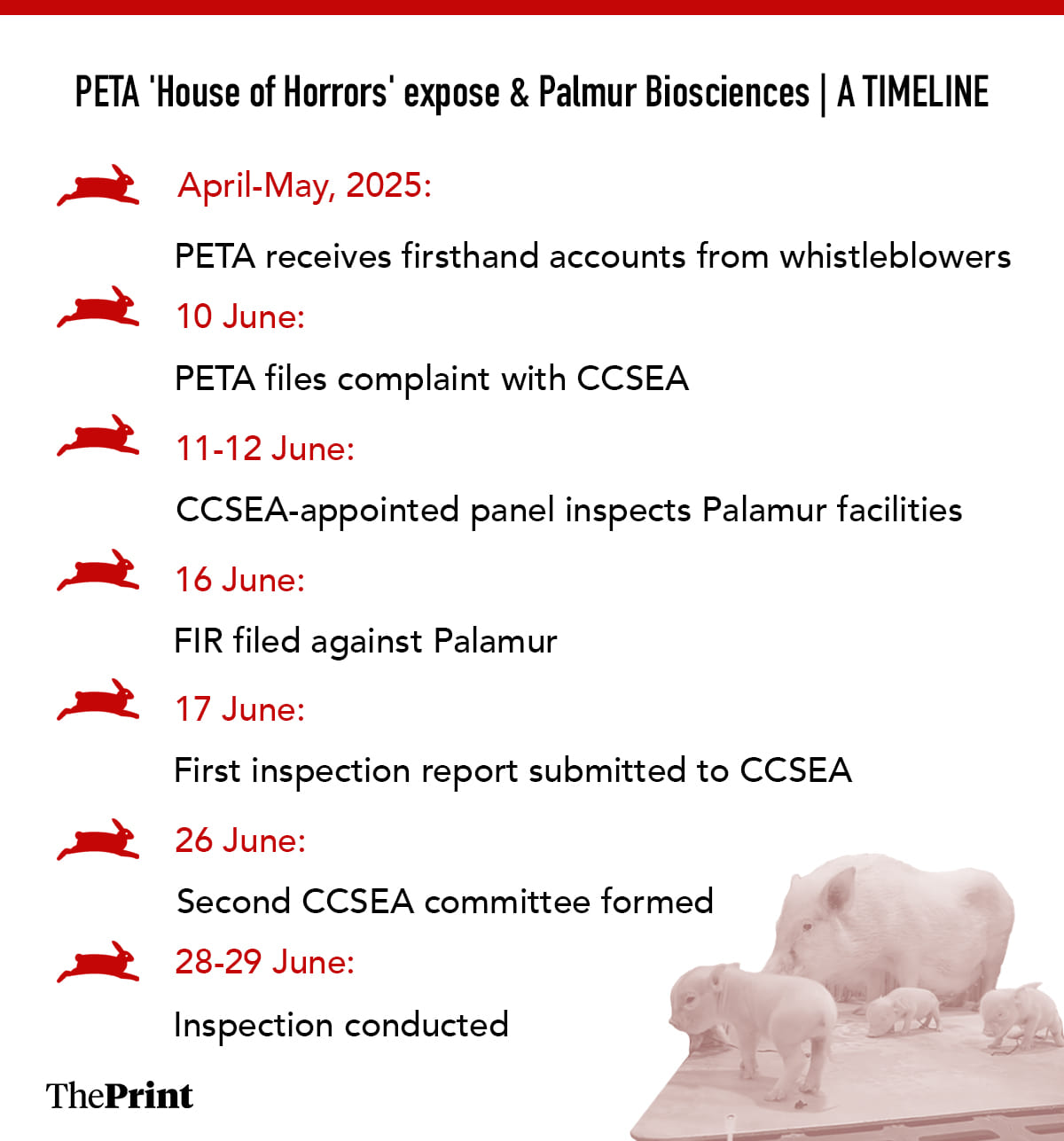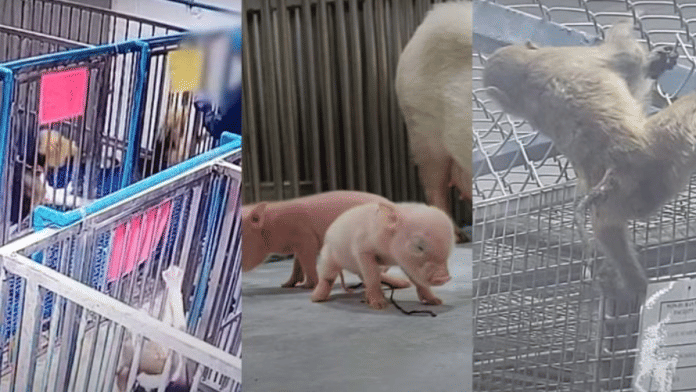New Delhi: Dogs lying in their blood, pigs gasping for air in tiny cages with their teeth pulled out, and sheep with neck ulcers caused by needles. These allegations of unethical testing made by animal rights body PETA have put a Telangana research facility, Palamur Biosciences, under the scanner.
But police FIRs, inspections that corroborated the claims of People for the Ethical Treatment of Animals (PETA), and even an enquiry committee instituted 25 June by the Committee for Control and Supervision of Experiments on Animals (CCSEA), have done little to get to the bottom of what’s happening at Palamur.
The condition of the 1,200 animals—which PETA and independent animal rights activists say are trapped at the facility—still remains unknown.
Dr Anjana Aggarwal, scientist and research policy adviser at PETA India, who first flagged the irregularities, said, “Their facility in Mahbubnagar is nothing short of a house of horrors.”
“Here, dogs, monkeys, pigs and rats are allegedly bred, injected and kept stuffed in tiny cages, while tests are run at their expense,” she said. Once deemed no longer “useful”, these animals are left to die slow and painful deaths.
“The photos and videos from the facility will send shivers down your spine. No living creature should be subjected to such cruelty,” Aggarwal said.
Palamur, however, has denied all allegations. “We are upholding the highest standards of commitment to ethical research and compliance,” a Palamur Biosciences spokesperson told ThePrint.
At their request, the CCSEA—a statutory body that regulates the experimentation on animals in India—established a second committee on 25 June to reinvestigate the charges.
The report is not out yet, even though a previous inspection in June had found the facility was overcrowded, animals were kept in poorly maintained conditions and the lab’s records underreported the number of animals being tested.
The lack of clarity on the fate of animals has pitted animal groups against the Palamur, which is a pre-clinical research organisation, and government bodies for failing to take action.
Dr M.A. Akbarsha, general secretary research coordinator National College Trichy, who is also involved with the Society for Alternatives to Animal Experiments (SAAE), said despite increased awareness and sensitisation against inhumane animal testing, many labs continue to indulge in such practices.
“The point is that most animal trials do not provide accurate results for human products. So, these labs are cruelly abusing animals for no great gain. Many labs like Palamur want to maximise their results which cannot happen if they abide by guidelines, and end up exploiting animals,” Dr Akbarsha said.

Preliminary inspection
When the PETA report was made public, the CCSEA carried out an inspection on 11 and 12 June, and their findings corroborated the allegations made by the animal rights group. The inspection committee found “serious and widespread non-compliance” with animal testing guidelines in India.
The facility was overcrowded, the animals were being underfed, handled roughly and abused, the CCSEA said in a preliminary report. Palamur lacked medicines and the infrastructure to house these animals and they were being euthanised without sedation.
Without sedation, the process of euthanisation can be distressing, painful and abrupt for the animal.
“Particularly disturbing were the euthanasia practices observed: beagle dogs were euthanised using thiopentone sodium without prior sedation, and monkeys subjected to invasive surgical procedures involving implantation and daily wound care were physically restrained using gloves, with only analgesics administered post-procedure and dressing, and no sedatives provided,” the report read.
“If the allegations by PETA have been confirmed by the CCSEA committee, then there is no reason to delay the rescue,” Dr Akbarsha said.
After forming an inquiry committee, the CCSEA conducted another inspection last month.
When contacted, a spokesperson for Palamur Biosciences confirmed that they house dogs, pigs, mini pigs, fish, cattle, rodents, and birds in their facilities, but denied keeping them in inhumane conditions.
“There was an inspection team that visited our facility 28 and 29 June. We will make the report public. We are confident it will clear the picture,” a company spokesperson said.
Glaring violations
Aggarwal first noticed the alleged irregularities by the Telangana-based lab back in December 2024. Posts by Palamur on their official LinkedIn profile caught Aggarwal’s attention for allegedly fudging information on the use of certain animals in lab tests.
She began digging deeper, and that is when the can of worms started opening.
She found that in May and June 2024, the US Environmental Protection Agency (EPA) and Health Canada’s Pest Management Regulatory Agency (PMRA) temporarily halted accepting studies generated by Palamur Biosciences due to alleged falsification of data following an inspection by the National GLP Compliance Monitoring Authority (NGCMA)—Indian body responsible for overseeing and ensuring compliance with Good Laboratory Practice (GLP) principles in testing facilities.
It was during her investigation that she found former employees and associates of Palamur, who were willing to testify against the lab’s alleged malpractices.
With the help of these whistleblowers, Dr Aggarwal collected numbing photos and videos of how animals were treated behind closed doors. The accounts of insiders and former employees show that the lab ran a Beagle breeding centre.
“These whistleblowers have collected evidence for the last three years. We collected and corroborated these between April and May this year,” she said.
On 10 June, PETA, with the help of Dr Aggarwal, filed a complaint with CCSEA, and on the subsequent two days, the first committee conducted its inspection. When nothing concrete came of it, PETA also filed a police complaint 16 June against Palamur.
The facility, designed for 800 dogs at any given time, housed at least 1,500. The breeding starts as soon as dogs turn 18 months despite clear norms under the Prevention of Cruelty to Animals Act, 1960, and the Dog Breeding and Marketing Rules of 2017, to allow ample gap between breeding cycles to give the mother time to rest, feed and recover between pregnancies. The dogs were over-bred, the PETA said in the police complaint.
“They are bred twice a year, and although the company’s policy is to breed the dogs for a maximum of five breeding cycles, the company often ignores its own policy, exceeding that limit. Dogs as old as 13 years have been used for breeding,” the whistleblower account read, according to the PETA complaint.
Overbreeding, coupled with a lack of socialising, led to the dogs in the facilities being anxious, showing symptoms of food aggression. “The company’s animal care staff were seen handling dogs roughly, with some workers kicking the animals or carelessly closing cage doors on their legs,” the PETA report read.
The report added that for certain studies, dogs were injected subcutaneously with test compounds. This caused many animals to develop abscesses, ulcers, and signs of severe pain.
The Palamur Biosciences spokesperson did not provide a counter to the allegations and the photo and video evidence presented by PETA.
Rescue awaited
It has been nearly a month since PETA’s first complaint to the CCSEA, but the animals are yet to be rescued from the facility. “Nobody can be above the law, yet over 20 days have passed since we brought evidence of egregious cruelty to beagles, monkeys and other animals at Palamur Biosciences to the committee for CCSEA attention,” Aggarwal said.
PETA, in an email statement to ThePrint, alleged that instead of acting on the whistleblowers’ accounts and the recommendations of its own inspectors—who corroborated misconduct and advised the immediate release and rehabilitation of the animals—the CCSEA has instead been trying “to attack, defame and intimidate PETA India”.
CCSEA chairperson Abhijit Mitra refused to comment on PETA’s allegations, citing a pending enquiry.
Dr Akbarsha said India needs to tighten its animal testing laws. “In most other countries, the laws to prevent animal testing are very stringent. It is for this reason that countries in the west outsource testing to labs in India. The problem also is that how do you trust data from such labs?” he added.
(Edited by Ajeet Tiwari)
Also Read: Inspection panel calls for rescue of 1,200+ animals from Palamur Biosciences facility. What it found







PETA has been an absolute nuisance for several decades. It must be banned at the earliest and all members/activists arrested.
PETA must be banned and it’s members/activists arrested and prosecuted.